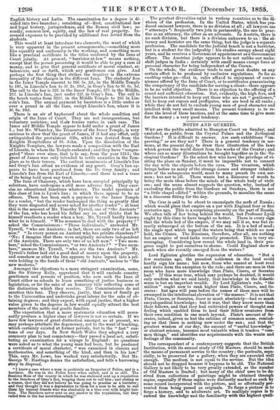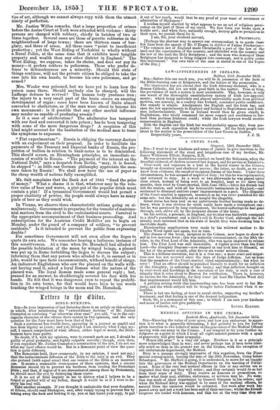NOTES AND QUF.RTFS.
Wire are the public admitted to Hampton Court on Sunday, and excluded, as public, from the Crystal Palace and the Zoological Gardens ? It is difficult to answer. Are such exhibitions "im- proving," or are they not? There is a general tendency in ser- mons, at the present day, to draw their illustration of the laws which govern the world direct from the works of the Creator ; and where can so many illustrations be brought together as in theme ological Gardens? To the select few who have the privilege of vi- siting the place on Sunday, it must be impossible not to connect the day with the objects before the eyes. The vivarium, which brings before ns many of the strange scenes and stranger inhabit- ants of the subaqueous world, must to many preach its own ser- mon; but not to all. There wants but a discourse of words to bring the mute ideas before the minds of the whole body of visit- ors ; and the scene almost suggests the question, why, instead of excluding the public from the Gardens on Sundays, there is not "a little chapel edified" within the grounds, to moralize the some in a discourse fitting for the day.
The Czar is said to be about to emancipate the serfs of Russia; which would place that empire on a par with England four or five centuries ago. This is a surprising precocity on the part of Russia. We often talk of her being behind the world, but Professor Lyell ought by this time to have taught us better. There is every sign that the whole bed of the empire, if we may call it so, was but re- cently submerged at the bottom of the sea. It is abed of mud.; the single spot which topped the waters being that which we now hold, the Crimea. The Russians, therefore, after all, are nothing but an empire of mud-larks recently promoted. This is very en- couraging. Considering how recent the whole land is, their pro- gress ought to put ourselves to shame. Could England show as much when she recently emerged from the waters ?
Lord Eglinton glorifies the expansion of education. "But a few centuries ago, the proudest nobleman in the land could hardly sign his name ; but now, those who cannot at least read and write form the exception to the rule ; and there are men in this room who have more knowledge than Plato, Cieero or Socrates had." If this were true, which may perhaps be doubted, it would only confirm what we said lately, that knowledge in the didactic sense is but an imperfect wealth. By Lord Eglinton's rule, "the million" ought now to rank higher than Plato, Cicero, and So- crates : but ages will pass before the names of these men will be swamped in the intellectual elevation of " the masses." It is not that Plato, Cicero, or Socrates, knew so much absolutely—had so much encyclopsedical knowledge; but it was, that they knew more than their fellows, and that they had cultivated powers of thought and feeling which enabled them to lead their fellow creatures from their own condition to one much beyond. Plato's account of So- crates, indeed, gives us but the sublime of common sense, remind- ing us that there is nothing new under the sun ; and that the greatest wisdom of our day, the amount of "useful knowledge" or abstract science, becomes most valuable when it teaches "com- mon things," and identifies our acquirements with the wants and feelings of the community.
The correspondent of a contemporary, suggests that the British Institution, with its annual study'of Old Masters, should be made the means of permanent service to the country ; the portraits, espe- cially, to be preserved for a gallery, when they are executed well enough. The medium is not equal to the service. But the idea should not be dropped because it happens to be old. The National Gallery is not likely to be very greatly extended, as the number of Old Masters is limited ; but many of the chief uses to be de- rived from collections of paintings might be obtained through oopies, especially if those copies were distinctly marked as such by some record incorporated with the picture, and so effectually pre- vented from being passed as originals. To forge a picture is to forge a history, and to adulterate art. To multiply copies is to extend the knowledge and the familiarity with the highest quell-
ties of art, although we cannot always copy with them the utmost nicety of perfection.
Mr. Justice Willes remarks, that a large proportion of crimes before the Assize Court at York were attended with violence : thirty persons are charged with robbery, chiefly in batches of two or three together. Several cases are those of garotte robberies in the neighbourhood of large towns ; there are thirteen oases of bur- glary, and three of arson. All these cases " point to insufficient protection ; yet the West Riding of Yorkshire is wholly without a Rural Police, at the same time that it exhibits more tangible property and wealth than any other district in England." The West Riding, we suppose, takes its choice, and does not pay its money—it prefers robbers to policemen. Those who prefer de- fence to defencelessness are a minority. Should this state of things continue, will not the private citizen be obliged to take the case into his own hands, to become his own policeman, and go armed?
Mrs. Wooler was poisoned, but we have yet to learn how the poison came there. Should anybody else be charged, will the Laffarge defence be revived ? The human body produces iron ; the injury to a very small part of the brain causes an amazing development of sugar ; cases have been known of limbs almost converted to chalkstone, as if the man were about to become his own monument : is it possible that any other morbid influence may render us capable of producing arsenic P Is it a case of adulteration P The adulterator has tampered with our food and converted it into poison; • has he been tampering with some of the more dangerous drugs? A suspicion of this kind might account for the hesitation of the medical-men to trace the symptoms to exposure.
"Fiat experimentnm" : Russia is obliging the currency-doctors with an experiment on their proposal. In order to facilitate the payments of the Treasury and Imperial banks of Russia, the pro- portion of bullion in relation to bank-notes is to be diminished. This should secure, on Birmingham principles, an immediate ac- cession of wealth to Russia. " The payment of the interest on the National Debt," says a despatch from Berlin, "may, it is feared, be stopped ": so little can German philosophy appreciate the mea- sure taken by Russia! We shall now have the use of paper as the cheap wealth of nations fully exemplified.
Mr. Salt complains that the Bank Act of 1844 "fixed the price of money." What a shame it is that, whatever may be the rela- tive value of beer and water, a pint-pot of the popular drink must contain a pint ! If a tyrannical Government would but permit a proper elasticity of pewter, the people could always have as many pints of beer as they could wish.
In Vienna, we observe three characteristic actions going on si- multaneously. Government is preparing for the transfer of matrimo- nial matters from the civil to the ecclesiastical courts. Carnival is the appropriate accompaniment of that business proceeding. And subscriptions for the Austrian Credit Mobilier are to begin on Monday, tinder the guard of a company of soldiers, " to prevent accidents." Is it intended to prevent the public from expressing doubts ?
For sometimes Government will not even allow the lieges to quote its own acts. We remember hearing a ludicrous instance of this sensitiveness. At a time when Dr. Herschell had alluded to the possible habitation of the moon by winged beings, a placard was put up in Rome forbidding the lieges to discuss die subject; informing them that any person who alluded to it, in earnest or in joke, would be ipso facto excommunicate, without benefit of clergy. .A.n. indiscreet Englishman who saw the placard on the walls with- out having read it, asked a loyal Roman what the nature of the placard was. The loyal Roman made some general reply ; hut, pressed for an answer, he ahudderingly covered his face with his hands. He felt that it was dangerous even to repeat the prohibi- tion in its own terms, for that would have been to use words touching the winged beings in the moon and Dr. Herschel],



































 Previous page
Previous page